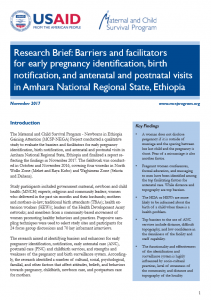
The Maternal and Child Survival Program – Newborns in Ethiopia Gaining Attention (MCSP-NEGA) Project conducted a qualitative study to evaluate the barriers and facilitators for early pregnancy identification, birth notification, and antenatal and postnatal visits in Amhara National Regional State, Ethiopia and finalized a report re- flecting the findings in November 2017. The fieldwork was conduct- ed in October and November 2016, covering four woredas in North Wollo Zone (Meket and Raya Kobo) and Waghimera Zone (Sekota and Dahena).
Study participants included government maternal, newborn and child health (MNCH) experts; religious and community leaders; women who delivered in the past six months and their husbands; mothers and mothers-in-law; traditional birth attendants (TBAs); health ex- tension workers (HEWs); leaders of the Health Development Army networks; and members from a community-based movement of women promoting healthy behaviors and practices. Purposive sam- pling techniques were used to select study sites and participants for 24 focus group discussions and 70 key informant interviews.
The research aimed at identifying barriers and enhancers for early pregnancy identification, notification, early antenatal care (ANC), postnatal care (PNC) and childbirth services, and strengths and weakness of the pregnancy and birth surveillance system. According- ly, the research identified a number of cultural, social, psychological, familial, and other factors that affect attitudes, beliefs, and behaviors towards pregnancy, childbirth, newborn care, and postpartum care for mothers.